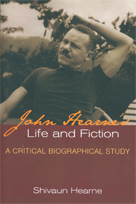
John Hearne’s Life and Fiction: A Critical Biographical Study (2013)
ABSTRACT
There are few literary biographies of West Indian writers, and fewer still of Jamaican writers. Because the literature of our region is comparatively young, the impetus has been to create the art forms rather than to reflect on the lives of the artists. The nuances of the colonial experience and postcolonial culture are varied and complex, and postcolonial scholars must, of necessity, consider the creators and their context as well as their creations.
John Hearne’s contribution to West Indian literature, though perhaps seeming out of place in twenty-first century Jamaica and mistakenly consigned to obscurity, was an important one. Hearne is integral to our cultural history. Shivaun Hearne’s literary biography of her father provides invaluable insights into his creative writing.
Shivaun Hearne oversees the editorial and production department of the University of the West Indies Press.
EDITOR’S NOTE
Shivaun Hearne’s MPhil thesis was an easy selection for the first book in this series. Completed in 1999, her biography of her father John Hearne is an invaluable repository of information on one of Jamaica’s most important literary figures of the twentieth century. When Shivaun undertook the project of her MPhil fourteen years ago she felt it necessary to defend and assert his position as key literary figure; that defence and assertion may still be necessary today.
John Hearne was a middle-class Jamaican writer whose novels were a voice for his class. That fact contributed to his fall from grace in the early post-independence era when the concerns of the country’s poor black majority rightly took precedence both politically and culturally. However, fifty years later, a re-visiting and re-assessment of Hearne’s fiction is overdue. Some work in this area has already started. The publication of Shivaun Hearne’s study should provide a catalyst for this process.

